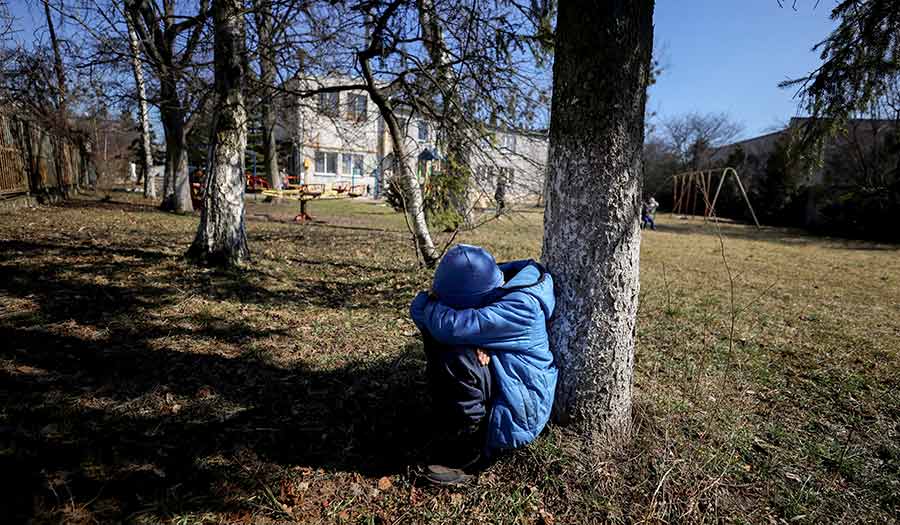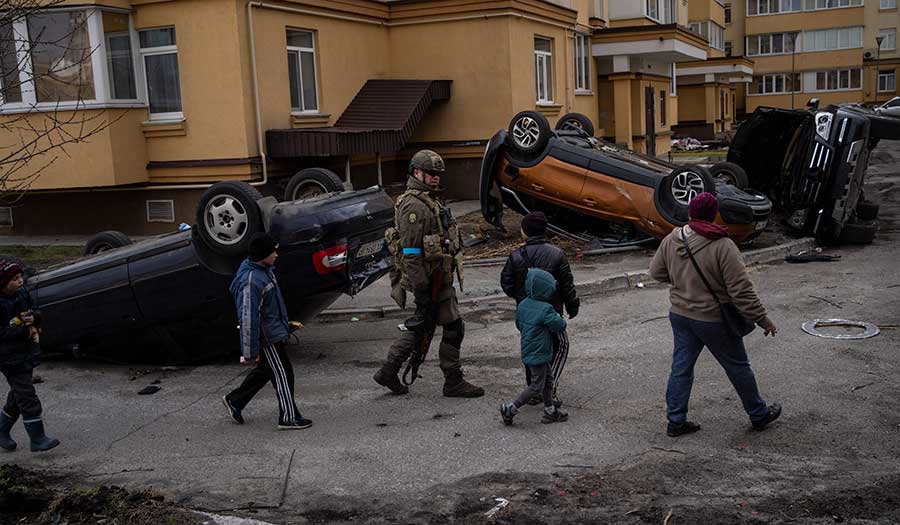 Reuters/Zohra Bensemra
Reuters/Zohra Bensemra
Article
Learn the why behind the headlines.
Subscribe to the Real Truth for FREE news and analysis.
Subscribe NowReuters – Nina spent her 16th birthday in a Lviv state shelter for children, far from her family and friends in the east of Ukraine, after she fled advancing Russian forces early in the war.
One of 23 children evacuated from another childcare center in Lysychansk, a town more than 620 miles away near the eastern frontlines, Nina says she misses her friends there and does not know when she will see them again.
“They always came to visit. We’ve been through so many things together,” said Nina, who ran away from home in February last year when her mother started drinking and bringing men to the house after her father died.
At first, Nina went to live with a friend, but her school found out and she was placed in Ukraine’s extensive childcare system last year. Ukraine has the biggest number of children living in state care in Europe, mostly because their families are either too poor or broken to look after them.
Nina has no desire to go back to live with her mother—and does not think her mother wants her at home—but the war has left her stranded and alone in a distant town.
Lviv shelter director Svitlana Havryliuk and her staff say they are doing their best to look after Nina and the other children, aged between 3 and 18, under their watch.
But Ukraine’s vast state childcare program, a legacy of the government’s prominent role in society during Soviet times, is struggling as war forces thousands to flee their homes and often makes tracing relatives impossible.
Before Russia’s invasion, Ukraine had 100,000 children living in nearly 700 state shelters, boarding schools and baby homes, according to UN children’s agency UNICEF.
The latest data, shared with Reuters by the ministry for social policy, showed that as of March 25 around 6,500 of these children had been evacuated to safer areas in the country or abroad since the beginning of the war.
Some 47,300—or almost half of the children in the system—have been hurriedly returned to their parents or legal guardians, which caregivers and child psychologists say raises its own challenges.
“The children come from places where there’s fighting,” Ms. Havryliuk told Reuters. “I don’t know how it works during a war…How will their parents be found? Who knows if they are alive? What if there is an emergency?”
No one at the Lviv shelter seems to know what happened to the parents of 5-year-old Nastya and her two brothers, aged 3 and 7, who, like Nina, were whisked away from Lysychansk on February 24, the day the war broke out.
Olga Tronova, the caregiver who brought them to Lviv in the far west of the country, said the only thing she knew was that they were taken away from their alcoholic mother late last year and no relative has tried to make contact with them since.
In the background, Nastya, wearing a pink coat with a pink and white bonnet, played in the sand in the garden playground outside. Her brothers climbed up and down a nearby slide.
Tough Choices
Some of the children in Ukraine’s network of shelters are orphans, but more often they have been taken from families struggling with drug addiction, alcoholism and domestic abuse. Around half of them have physical or mental disabilities.
The sheer number of children in need, and Ukraine’s relatively short wait time for adoptions, made the country a popular destination for adoptive families in the West.
According to U.S. government figures, for example, Ukraine was the top European country of origin for adoptions by U.S. parents over the past 15 years.
The system has long been questioned by child welfare organizations including UNICEF and Save the Children, which have argued that whenever possible the priority should be to support families before they reach a breaking point.
Now the war has caused further upheaval for tens of thousands of children in state care.
The ministry for social policy said 230 state homes—a third of the total—had been evacuated as of March 25, and caregivers face tough choices over whether to reunite children with parents or guardians if it gets them further from the war zone.
Child psychologist Oleksii Heliukh, who is helping the young residents of the Lviv shelter, said sending children back home without proper vetting could do more harm than good.
“When children are taken from their families, it happens for a reason. If their needs were not met in peaceful times, then things can get worse during a war.”
But Volodymyr Lys, regional head for child protection under the ministry of social policy in Lviv, said that wartime danger meant authorities often had little choice.
“The biggest risk is being killed by a bomb, trust me…It is clear that no matter who the parents are, they are still parents.”
Children Traveling Alone
Fighting has also separated families where children had been living with their parents, and aid agencies have warned that significant numbers of unaccompanied children have crossed into neighboring countries and beyond.
“We’ve had reports of children traveling alone ending up in Spain, Italy, the Netherlands, Germany,” said Amanda Brydon, a child protection expert at Save the Children, which has been working in Ukraine since 2014.
These may be children on their way to reach relatives or friends in Europe, she said. People smuggling is a big concern.
“What we don’t have is a systematic registration and tracking system of these children,” she said. “It’s been quite a chaotic system to try and track.”
Mr. Lys, the regional head for child protection, said the situation had improved since the first few weeks of war thanks to the help of international aid agencies inside and outside Ukraine.
With documents and records lost or destroyed, and 1.8 million children estimated by UNICEF to have fled the country so far, the Kyiv government has tightened border checks and suspended adoptions, already disrupted by the COVID-19 emergency.
Aid agencies welcomed the move.
Ms. Brydon at Save the Children said they had been “inundated” with calls from would-be adoptive families keen to help, but warned of the risk of legal standards being ignored and children being separated from parents who are still alive.
For the 47 children of the Lviv shelter and those in other state institutions, that could mean having to wait out the war.
Ms. Tronova, the caregiver who was working in a state center for children in Lysychansk when the war broke out, remembers vividly the phone call she got at dawn on February 24.
“Olga, now! You need to pull the children out,” she recalls the shelter principal telling her, before hearing an explosion in the distance. She rushed to fetch the children, leaving her own family behind.
In the three days that it took to get to Lviv by train, the smallest ones fell sick. “When they arrived here, they all had nausea, they vomited, they had fever,” said Ms. Havryliuk.
Since then, she and the other caregivers, helped by university students-turned-volunteers, have tried to restore a sense of normality and calm.
The children are well fed and sleep in neat dormitories with flowers, trees and animals painted on blue and green walls.
Neighbors who before the war would barely say hello have showered the shelter with food, clothes and toys. On one of the days Reuters visited, a Polish charity sent stuffed teddy bears from France with the word “Courage” written on them.
But even in the relative tranquility of Lviv, which has been largely spared heavy bombardment and combat but where nights are punctuated by anti-raid alarms, the war is never far away.
“The children are sleeping, then the siren goes off and they start to scream,” Ms. Havryliuk said.
All but two of the 23 children who arrived from Lysychansk are still legally in their parents’ custody. In normal times, courts would decide whether to strip families of their parental rights.
One child with psychiatric problems, 11-year-old Timofey, was two days away from being placed into foster care, but that fell apart as he, too, was evacuated to Lviv.
“He is very angry,” Ms. Tronova said. “I cannot predict anything for my future or the children’s. The only thing I can say is that we are at God’s mercy.”
- World News Desk
- EUROPE
 ‘It’s Not the End’: The Children Who Survived Bucha’s Horror
‘It’s Not the End’: The Children Who Survived Bucha’s Horror
More on Related Topics:
- Spain Is Granting Legal Status to Potentially 500,000 Immigrants
- Bulgaria’s Government Resigns After Mass Protests
- 10 Years After the Bataclan Massacre, Paris Is Still Scarred by That Night of Terror
- French Government Collapses in 14 Hours, Deepening Political Crisis
- French Parliament Ousts Prime Minister, Deepening Political Crisis


